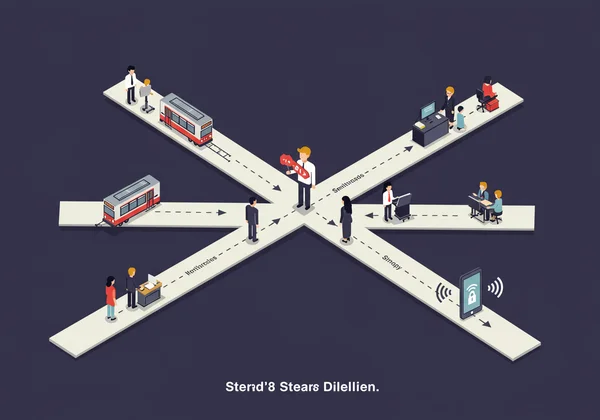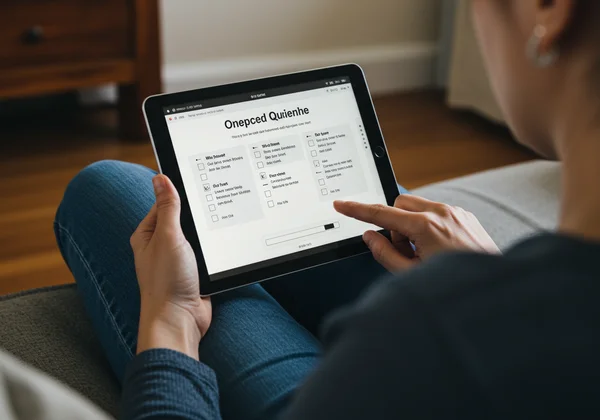道德測驗問題:10個挑戰你倫理觀的困境
August 26, 2025 | By Julian Croft
你是否曾好奇,當面對艱難抉擇時,究竟是什麼引導著你的決定?我們每個人心中都有一把內在的羅盤,但在面對挑戰情境之前,它的真北方向往往不明確。本文提出了10個發人深省的 道德測驗 問題,旨在挑戰你的倫理框架並揭示你的核心價值觀。 我該如何釐清我的道德和價值觀? 這始於提出正確的問題並觀察你自己的反應。準備好探索你最深層的信念,並揭示真正驅動你的動力。若要獲得全面的分析,你隨時可以前往我們的主網站 探索你的倫理觀。

是什麼讓道德測驗問題真正具有洞察力?
最能揭示真相的倫理問題很少是關於簡單的是非對錯。它們存在於生命的灰色地帶,迫使我們權衡相互競爭的價值觀和原則。一個真正富有洞察力的 道德測驗 不僅僅給你一個分數;它為你的決策過程提供了一面鏡子。這些情境的設計目的不是評判你,而是幫助你更深層次地了解自己。
超越簡單的是非對錯:倫理的細微之處
現實世界的倫理是混亂的。它們涉及情境、關係和無法輕易歸類的後果。接下來的困境問題旨在反映這種複雜性。它們超越了簡單的道德規則,探索你個人 道德價值觀測驗 的複雜網絡。透過與這種細微之處的互動,你開始看到你選擇背後的「為什麼」,而不僅僅是「什麼」。
倫理困境在自我發現中的力量
倫理困境是個人成長的強大工具。它們就像你道德肌肉的心理鍛鍊,增強你深思熟慮的決策能力。當你面對一個假設性的挑戰時,你可以自由地探索你的直覺,而無需承擔現實世界的後果。這個過程揭示了你性格的基石,例如你傾向於同情、公平、忠誠或權威。這是校準你的 倫理羅盤 的第一步。
你的個人道德測驗:探索10個倫理困境
以下是10個旨在讓你思考的情境。閱讀每一個,考慮選項,並密切關注你的直覺反應和理性思考。沒有正確答案——只有你的答案。

困境1:經典電車難題:行動還是不行動?
一輛失控的電車正沿著軌道高速駛向五個被綁住無法動彈的人。你正站在一個拉桿旁。如果你拉動這個拉桿,電車將會轉向另一條軌道,那裡綁著一個人。你會拉動拉桿,犧牲一個人來拯救五個人,還是什麼都不做,任由事情發生?這個經典困境將功利主義(為最多數人帶來最大利益)與禁止主動造成傷害的原則對立起來。
困境2:職場中的忠誠與真相:舉報不當行為
你是一名初級員工,你發現你的摯友兼經理(他曾是你的好導師)正在偽造報銷單以彌補個人財務困難。舉報他們肯定會讓他們被解僱,甚至可能面臨法律訴訟,毀掉他們的職業生涯。保持沉默則意味著縱容不道德行為,如果被發現,你也會牽連其中。你的忠誠何在?
困境3:演算法偏見與公平性:誰能獲得貸款?
你是一個團隊的成員,該團隊開發了一個人工智慧演算法來批准銀行貸款。你注意到這個人工智慧始終拒絕來自特定低收入社區的申請人,即使有些申請人看起來是符合資格的。數據顯示,這是因為歷史上該地區的違約率較高。你會批准這個演算法,相信數據可以將風險降到最低,還是會介入使其更公平,但可能增加銀行的財務風險?這是現代 倫理問題 中的一個核心挑戰。
困境4:隱私與公共安全:監控倫理
為了預防未來的恐怖襲擊,政府提出一項計畫,要求所有公民在手機上安裝監控應用程式,以監測可疑活動的通訊。該計畫極有可能預防襲擊並拯救生命。然而,這也意味著所有人的個人隱私將大幅喪失。為了集體安全,你會支持這項措施嗎?
困境5:環境責任與個人代價:永續選擇
你所在小鎮的主要雇主是一家工廠,它為數百名居民提供工作,但也因污染當地河流而聞名。關閉工廠將會摧毀當地經濟,導致大規模失業和貧困。讓它繼續營運則意味著持續的環境破壞。作為鎮議會成員,你會如何投票?
困境6:基因增強的倫理:設計嬰兒?
想像一下,醫療技術允許父母編輯他們未出生孩子的基因。最初,它被用來消除使人衰弱的遺傳疾病。但很快,父母們希望增強孩子的智力、運動能力或外貌。你認為這項技術應該被允許嗎?你將治療與增強之間的界線劃在哪裡?
困境7:言論自由與有害內容:線上審核
你經營一個受歡迎的社群媒體平台。一位用戶開始發布內容,這些內容雖然不違法,但卻宣揚有害的陰謀論並煽動對少數族群的仇恨。允許這些內容存在是堅持言論自由的承諾,但它也助長了一個有毒且潛在危險的環境。你會移除內容並禁止該用戶,還是讓它保留?這是現代數位生活的一個關鍵 道德基礎測驗。
困境8:危機中的資源分配:分配稀缺援助
在一場大流行病期間,你負責分發數量有限的救命藥物。你只有足夠的藥物供給一小部分需要它的人。你會將其分發給「先到先得」的人,還是分發給無論如何可能都無法存活的最重症患者,還是分發給生命最長久的年輕患者,或是分發給醫生和急救人員等必要工作者?
困境9:動物權利與人類利益:動物實驗
一種可以治癒致命人類癌症的新藥已經開發出來,但其最終測試階段需要對靈長類動物進行測試。這項測試將導致所涉動物的痛苦和死亡。如果沒有這項測試,該藥物將無法獲准用於人類,數千人將繼續死於這種疾病。你會批准動物實驗嗎?
困境10:數位身份與匿名性:線上人格的倫理
你發現一位以其鼓舞人心和真實內容而聞名的網路名人,正在使用虛假身份和人生故事與其受眾建立連結。他們的訊息是正面的,並幫助了許多人,但它是建立在謊言的基礎上。你會揭露他們的欺騙行為,可能讓數千名追隨者感到幻滅,還是讓這個「高貴的謊言」繼續下去,因為它似乎正在帶來好處?
解讀你的回應:這些倫理問題揭示了什麼?
僅僅思考這些困境就是一個有價值的練習。你的回應不是為了獲得「分數」,而是為了揭示你自身道德推理中的模式。回答這些 道德測驗問題 可以闡明指導你的核心原則,而你往往甚至沒有意識到。
如何識別你的核心道德價值觀
你是否始終優先考慮同情心和防止傷害?也許「關懷與傷害」基礎對你來說很強。你是否傾向於維護規則、責任和秩序?這可能指向你對「權威/顛覆」的高度重視。反思你的答案,尋找一個重複出現的主題。了解這些模式是真正識別你的價值觀的第一步。一個結構化的 道德評估測驗 可以科學地幫助繪製這些傾向。
理解不同的倫理框架在起作用
你的回應可能與既定的倫理框架相符。如果你專注於結果(例如在電車難題中拯救最多生命),你就是在像一個功利主義者一樣思考。如果你專注於行動本身(不想主動造成傷害),你則傾向於義務論。兩者都沒有「更好」之分,但了解你的自然傾向可以為你的倫理羅盤提供深刻的洞察。若要更深入地探討,完整的 道德羅盤測驗 可以根據這些框架分析你的結果。
倫理自我發現的下一步:參加完整的道德測驗
思考這些道德困境的例子是一個絕佳的開始。但若要獲得對你獨特倫理概況真正個人化、深入的理解,你需要一個更全面的工具。這十個問題只是觸及表面;一個完整的 道德測驗 會更深入,使用經過科學驗證的情境和人工智慧驅動的引擎,提供一份關於你的優勢、挑戰和道德傾向的詳細報告。
你準備好超越假設,獲得關於你的倫理核心的真實、可操作的洞察了嗎?你的自我發現之旅才剛剛開始。立即 參加免費道德測驗,並獲得你道德羅盤的個人化分析。

關於道德測驗與倫理的常見問題
什麼是道德測驗,它如何幫助我?
一個 道德測驗 是一種工具,旨在幫助你探索你的倫理和道德推理。它使用一系列基於情境的問題來評估你與各種道德基礎和倫理原則的契合度。它幫助你獲得自我意識,理解你的決策過程,並識別你的核心價值觀,這對於個人和專業成長至關重要。
我該如何釐清我的道德和價值觀?
釐清你的道德和價值觀是一個反思的過程。從思考上述的困境開始。你也可以想想你欽佩的人以及他們所具備的品質。為了更結構化的方法,一個 線上道德測驗 提供了一種系統化的方式來分析你的回應,並為你呈現一個清晰的倫理概況總結。 探索你的結果 以開始。
線上道德測驗真的能揭示我的倫理羅盤嗎?
是的,一個設計良好的測驗可以提供非常準確的洞察。例如,我們的平台是由一群倫理學家、心理學家和人工智慧專家團隊開發的。雖然沒有任何測驗能捕捉一個人100%的複雜性,但我們的 免費道德測驗 運用了經過驗證的心理學原則,提供了你倫理羅盤的可靠且富有洞察力的快照,為自我反思提供了堅實的基礎。
探索道德困境例子有什麼好處?
探索 道德困境例子 就像是你大腦的鍛鍊。它能增強批判性思維,透過迫使你考慮多個視角來培養同理心,並為你準備好應對現實生活中的倫理挑戰。它能釐清你自己的價值觀,這樣當你面對艱難的決定時,你可以更有自信和正直地行動。對於任何尋求個人成長的人來說,這都是一個極其寶貴的練習。